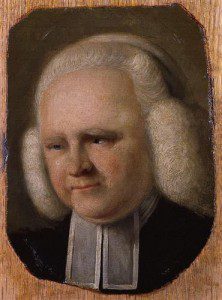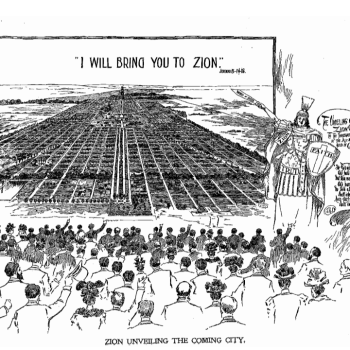In time for the three hundredth anniversary of the birth of George Whitefield (pronounced Whit-field), my co-blogger Thomas Kidd has just published a biography of the man he terms America’s Spiritual Founding Father. [Yale University Press identifies October 28 as the book’s release date, but it is already shipping].
Kidd’s George Whitefield is an eminently readable and informative book. It begins with a simple yet critical argument: “George Whitefield was the key figure in the first generation of Anglo-American evangelical Christianity.” Wesley started what became a major denomination. Edwards made far more serious and sustained theological contributions. Whitefield, though, tied together two continents and — with less success — a host of Protestant movements for the common cause of spreading “the new birth.”
Whitefield’s early years of itinerant ministry in particular were marked with both incredible success and contention. Kidd carefully traces the Calvinist Whitefield’s tortured relationship with the Arminian Wesleys, who openly opposed the theological tenets that Whitefield held dear. Whitefield also broke with the Moravians, whose Pietism he had once admired. And, of course, Whitefield made many other enemies: Dissenting colonial ministers he termed unconverted, Scottish Presbyterians who rejected him when he refused to embrace their ecclesiology, and Anglican leaders in the southern United States who tried to sanction him for his itinerant threat to their own authority.
This is not a book designed only for academics. It should gain a broad readership. For instance, evangelicals of all sorts will find Whitefield’s ministry both inspiring and — at times — troubling. Kidd succinctly and sympathetically outlines Whitefield’s understanding of the “new birth”:
A renovation of the heart was required for people to become fit for heaven. Religious duties — attending church, praying, and fasting — were important and could help put a person in the path of grace. But to Whitefield, observing churchly rituals had nothing to do with securing the new birth, which required a miraculous infusion of faith, effected by the Holy Spirit. Nothing short of a soul-transforming conversion would save people.
Whitefield himself struggled mightily for years until he felt convinced that God had wrought this work of regeneration in his own soul, and he spent the rest of his life trying to bring others to that same point of blissful assurance. On his last trip to Charleston, Whitefield preached at a large meeting house. A free African American apprentice and musician named John Marrant was there. He went inside intending to interrupt the meeting by blowing his french horn. Instead, he saw Whitefield point directly at him and declared the words of Amos: “Prepare to meet thy God, O Israel.” Marrant collapsed. When he revived, Whitefield continued to preach. “Every word I heard from the minister was like a parcel of swords thrust into me,” he recalled. Eventually, Whitefield visited Marrant after the service. “Jesus Christ has got thee at last,” Whitefield promised him. Marrant became an evangelical preacher himself, minsitering to black Nova Scotians. While most did not become preachers themselves, tens of thousands of men and women on both sides of the Atlantic had similar spiritual experiences through Whitefield’s preaching. Whitefield, Kidd notes, did not hesitate to use either media publicity, dramatic speaking techniques, or his own celebrity in order to bring more individuals into a salvific relationship with Jesus Christ.
While he defends Whitefield from charges of superficiality and self-aggrandizement, Kidd notes Whitefield’s struggles with sexual temptation, his “callous” treatment of his wife Elizabeth, and his acceptance of slavery. The latter included not only the personal acquisition of slaves but also the illegal importation of slaves into Georgia prior to its legalization in that colony. Only at the end of his life did Whitefield’s slaveholding attract criticism. “Our surprise,” lamented the Boston Liberator, “is great that he who thus eloquently denounced the system of slavery in 1740, should so far lose sight of the principles of justice in 1770 as to advocate a speculation in the bodies of the blacks for the benefit of a literary institution.” Most white Americans, sadly, saw no contradiction between evangelical faith and owning Africans and their descendants as property.
The book’s subtitle suggests — at least it did to me prior to reading the book — a close connection between Whitefield, evangelical Protestantism, and the patriot cause of the American Revolution. Kidd presents hints that Whitefield sympathized with American complaints about British policies toward its North American colonies, but we do not possess very much evidence. Thus, Kidd concludes that “it is difficult to say how Whitefield would have handled America’s independence.” Indeed, perhaps it would be better to call Whitefield trans-Atlantic evangelicalism’s founding father than America’s. Although within two generations of his death many American evangelicals had cast aside Whitefield’s Calvinist in favor of Wesley’s Arminianism, Whitefield in many respects brought forth the substance and style of religiosity that characterized the religious atmosphere of the Early Republic.
One closing thought. Whitefield himself regretted the combative revivalism of his early years. He moderated his rhetoric and his approach (although he did not bend on his Calvinist theological principles). That shows wisdom, for there was something uncharitable and unseemly about the radical revivalist impulse to denounce its opponents as unconverted. The young Whitefield demonstrated what became a lamentable evangelical trait to question the authentic faith of less fervent or non-evangelical Christians. Too many evangelicals have presumed that their theological or ecclesiastical opponents do not really “know Jesus Christ” or are somehow not serious in their faith. I know, because I used to make such presumptions.
One should readily understand how the evangelical tendency toward self-righteousness infuriates other Christians. Whitefield by and large came to understand this problem. For all of the criticism he received, Whitefield retained a capacity to forgive his theological opponents (such as the Wesleys) and also developed a remarkable capacity for self-reflection and self-correction. Thus, Kidd rightly praises “the first modern transatlantic celebrity” for his “substantial integrity, spiritual sincerity, phenomenal ability, and indefatigable energy.”












